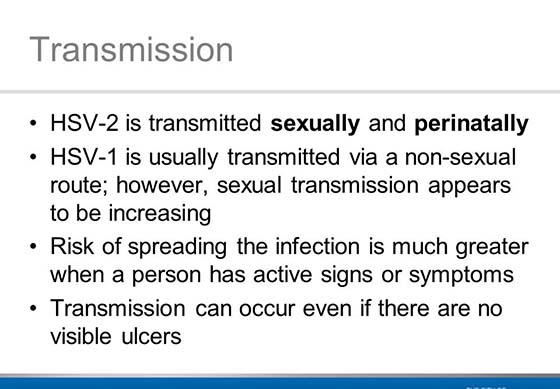How is herpes transmitted
Herpes is easily spread from skin-to-skin contact with someone who has the virus. Genital herpes is transmitted from one person to another through sexual contact. Sexual contact includes intercourse, oralgenital contact and rubbing the genitals together without clothing in between (sometimes known as "outercourse").
Direct contact with the live virus including:
- Any direct contact with an herpes infection
- Kissing, touching or caressing actively infected areas
- Sexual contact (vaginal, oral, or anal sex)
Herpes can be passed even if the penis or tongue doesn't go all the way in the vagina, anus, or mouth. You don't have to cum to spread herpes. All it takes is some quick skin-to-skin touching. You can also get herpes from kissing someone who has oral herpes.
The skin on your genitals, mouth, and eyes can be infected easily. Other areas of skin may get infected if there's a way for the herpes virus to get in, like through a cut, burn, rash, or other sores. You don't have to have sex to get herpes. Sometimes herpes can be passed in non-sexual ways, like if a parent with a cold sore gives you a peck on the lips. Most people with oral herpes got it when they were kids. A mother can pass genital herpes to a baby during vaginal childbirth, but that's pretty rare.
Most people get HSV1 as a child
Oral HSV-1 is often the most easily acquired herpes infection. Usually the first herpes simplex virus that people encounter, oral HSV-1, is typically spread simply by the kind of social kiss that a relative gives a child. Because children have no prior infection with any HSV type, they have no immune defense against the virus.
By the time they're teenagers or young adults, about 50% of Americans have HSV-1 antibodies in their blood. By the time they are over age 50, some 80-90% of Americans have HSV-1 antibodies.
Almost all HSV-2 is encountered after childhood
Almost all HSV-2 is encountered after childhood, when people become sexually active. Those who have a prior infection with HSV-1 have an acquired immune response that lowers – though certainly doesn't eliminate-the risk of acquiring HSV-2. According to one study (Mertz, Annals of Internal Medicine,1992), previous oral HSV-1 infection reduces the acquisition of subsequent HSV-2 infection by 40%.
You can get herpes from oral sex
When someone has a cold sore on their mouth or simply an oral infection with no sores present, and is the giver of oral sex to someone else, the virus can be spread from the mouth to the genitals. The receiver of the oral sex might then get genital herpes type 1. The virus type doesn't change (that is, it doesn't change from type I to type II because it is in the genital area),but the cold sore virus will simply live, and possibly recur, in the area of the genitals.
Cold sores have been around for a long, long time, and some people find it hard to accept that these can indeed be the source of genital herpes infections. But as oral sex becomes more common, the incidence of getting genital herpes in this way is increasing. Anal intercourse can also transmit the virus to the rectal area, though remember, many people who get herpes outbreaks around the rectum and the buttocks have not had anal sex.
Can HSV2 be transmitted through oral sex?
Yes, HSV2 can be transmitted through oral sex. Although it is uncommon for HSV2 to be transmitted through oral sex, it is still a possibility. HSV2 is typically passed along from one person to another through vaginal or anal intercourse.Similarly, a person who is infected with HSV2 in the oral area can potentially cause genital herpes in others by giving oral sex. HSV-2 doesn't like the oral environment. In fact, only 3% of oral herpes outbreaks are from HSV-2.
A dental dam is a latex barrier that can be placed over the vulva/vagina (and anal area if involved) to prevent skin-to-skin contact during oral sex.
Have a better sex life! Meet nearby people with herpes

PositiveSingles is one of the most popular dating websites for people suffering from herpes and other STD. It was initiated in 2001. With 1,510,800+ members you are sure to find lots of potentail people around you.
Join and meet nearby people with herpes, browse profiles and chat now!
How can you contract cold sores?
Cold sores are generally contracted from skin to skin contact with an infected area. For example, if someone has a cold sore on their lip they can pass on the virus to another person's mouth through kissing. HSV-1 is often the most easily acquired herpes infection. Usually the first herpes simplex virus that people encounter, oral HSV-1, is typically spread simply by the kind of social kiss that a relative gives a child. Because children have no prior infection with any HSV type, they have no immune defense against the virus.
By the time they're teenagers or young adults, about 50% of Americans have HSV-1 antibodies in their blood. By the time they are over age 50, some 80-90% of Americans have HSV-1 antibodies.

Can herpes be spread Without Symptoms?
Most people get herpes from someone who doesn't have any sores. Sometimes those who know they are infected spread the virus between outbreaks when no signs or symptoms are present. This is called asymptomatic transmission. It may live in your body for years without causing any symptoms, so it's really hard to know for sure when and how you got it. That's why so many people have herpes — it's a pretty sneaky infection.
Because the virus dies quickly outside the body, you can't get herpes from hugging, holding hands, coughing, sneezing, or sitting on toilet seats.
Herpes can transmit from one part of the body to another
You can spread herpes to other parts of your body if you touch a herpes sore and then touch your mouth, genitals, or eyes without washing your hands first. You can also pass herpes to someone else this way.
This phenomenon is called autoinoculation. Autoinoculation almost always occurs during the first outbreak when the immune system has not yet produced a competent immune response to the herpes. Autoinoculation is quite uncommon, or many more children would have genital herpes as a result of touching their cold sores and then touching their genitals, as children seem to do.
One specific area of concern is the transmission of the virus from the mouth to the eyes. If someone has a cold sore, it is important that they wash their hands carefully between touching a sore and rubbing their eyes. Saliva should not be used to wet contact lenses. HSV 1, not HSV 2, causes the majority of ocular HSV. However, having said all of that, the group of nerves that innervates the mouth and lips also supplies nerves to the eye so it is possible to have herpes of the eye simply because the virus from oral herpes travels along the eye nerve
Is one type of herpes more easily spread than another?
No, not really. Both HSV1 and HSV2 can be easily transmitted via skin-to-skin contact. HSV1 tends to prefer locations above the waist, such as the mouth, and HSV2 tends to prefer locations below the waist, such as the genitals, but both can also be easily spread to other parts of the body.
Both types are most contagious during active outbreaks – when visual symptoms are present – but they are also commonly spread when there are no recognizable symptoms through asymptomatic shedding.
Can you catch genital herpes if you use a condom?
Condoms offer very good protection from many sexually transmitted diseases, including genital herpes. As the herpes virus is transmitted via skin contact rather than sexual fluids, condoms do not provide 100% protection. Condoms cover the man's penis but still allow for skin contact in the genital area, which means that a small risk of catching herpes remains.
Can you catch genital herpes from oral sex?
You can catch herpes from performing or receiving oral sex. If you receive oral sex from someone who has a cold sore, the virus which causes cold sores can cause sores on your genitals.If you perform oral sex on someone who has genital herpes, you can develop sores in your mouth as a result.
Can you get genital herpes from kissing?
You can not catch genital herpes by kissing someone who has it. However, if you kiss someone who has cold sores you can catch the virus which causes oral herpes.
Is it possible to catch herpes from a toilet seat?
You can not catch genital herpes - or any other STI - by using a public toilet. The virus does not survive outside the body and you can only catch it via intimate contact with an infected person.
Can Herpes be passed to baby?
If a woman with genital herpes has virus present in the birth canal during delivery, herpes simplex virus (HSV) can be spread to an infant, causing neonatal herpes, a serious and sometimes fatal condition. Neonatal herpes can cause an overwhelming infection resulting in lasting damage to the central nervous system, mental retardation, or death.
Women who acquire genital herpes before they become pregnant have a very low risk of transmitting the virus to their babies. This is because their immune systems make antibodies that are temporarily passed to the baby through the placenta.
How common is genital herpes?
Herpes infection is common. About 1 in 8 people aged 14-49 in the U.S. has genital herpes. Related percentage of population with herpes.
Celebrities with herpes
Herpes is very comon. Many people are affected herpes. Many celebrities have opened up about their herpes issues. Sometimes, it helps to hear that celebrities aren't so flawless after all. Contiue to read the list of famous peopl with Herpes. They are rumored or confirmed. You are not alone.
Have herpes & feel alone? Meet nearby people with herpes

PositiveSingles is one of the most popular dating websites for people suffering from herpes and other STD. It was initiated in 2001. With 1,510,800+ members you are sure to find lots of potentail people around you.
Join and meet nearby people with herpes, browse profiles and chat now!
Know more facts about herpes outbreak:
First herpes outbreak | Recurrent herpes outbreaks | Stages of a herpes outbreak | How long does a herpes outbreak last | How often do herpes outbreaks occur? | What can trigger herpes outbreaks? | How to recognize a herpes outbreak? | How to prevent herpes outbreaks | Viral shedding | Herpes treatment | How to strengthen your immune system
Incoming search terms for the article:
- Can you catch genital herpes if you use a condom?
- Can you get genital herpes from kissing?
- Can Herpes Be Spread Without Symptoms?
- Can Herpes be passed to baby?
- Is it possible to catch herpes from a toilet seat?
- How easily is herpes spread?
- How is herpes transmitted non sexually?
- How can you pass herpes?
- How is herpes transmitted?
- hsv 2 transmission facts
- herpes transmission facts
- oral herpes tranmission
